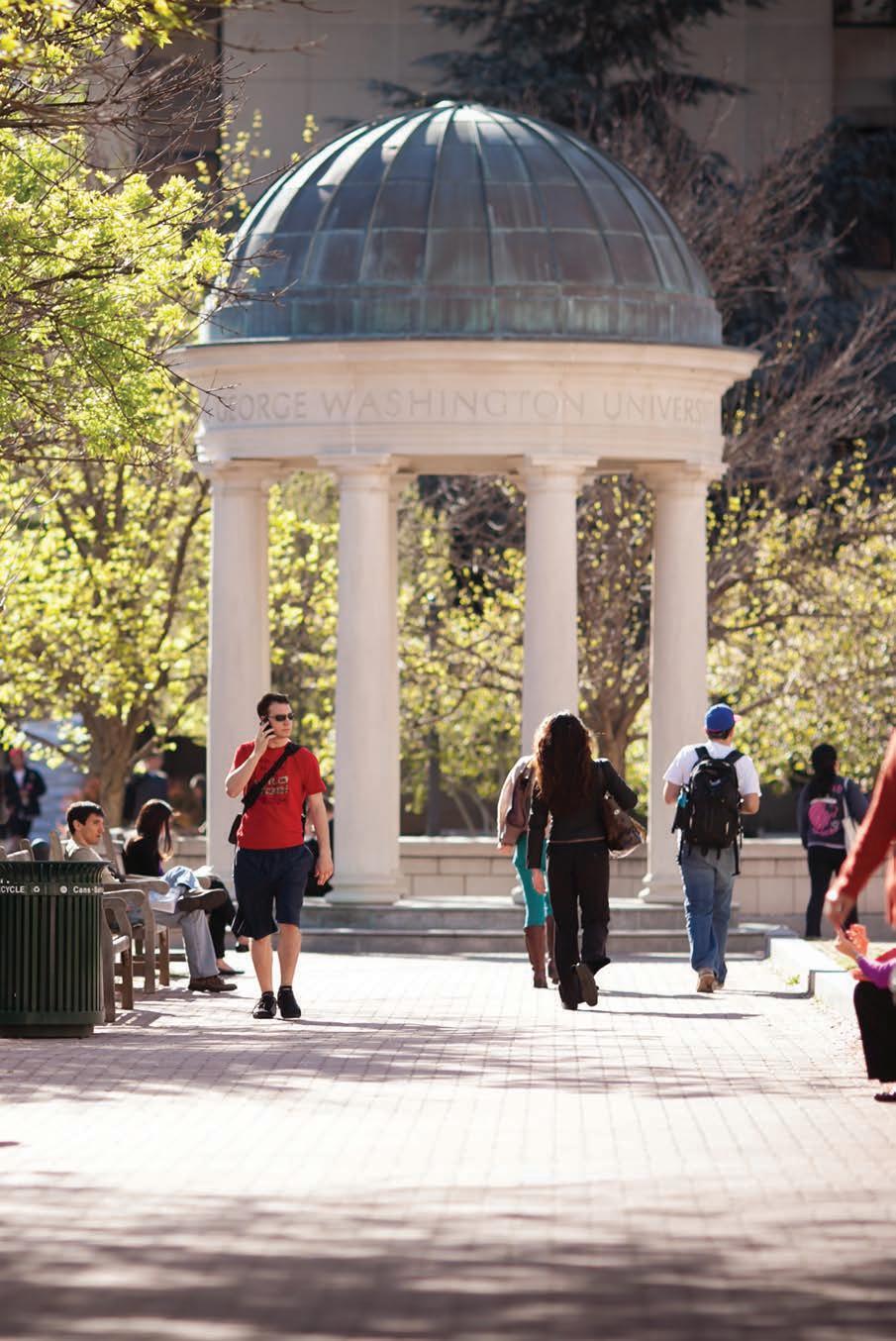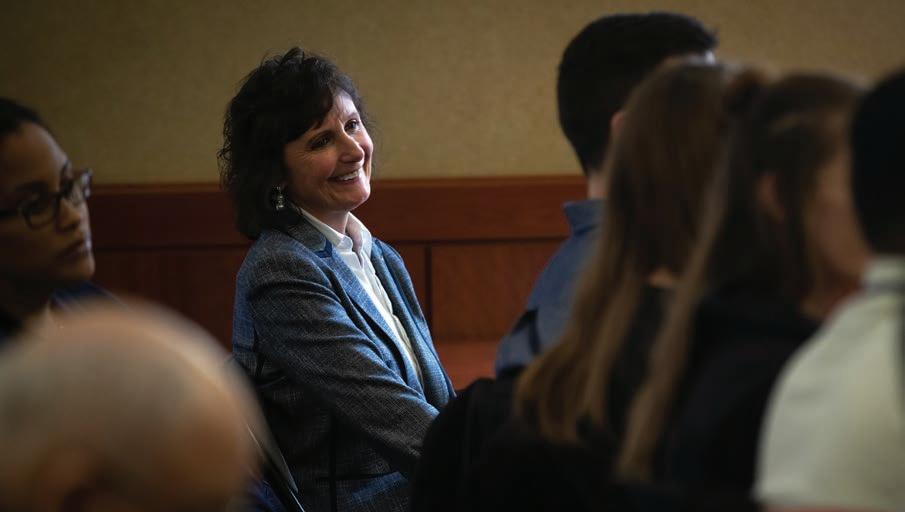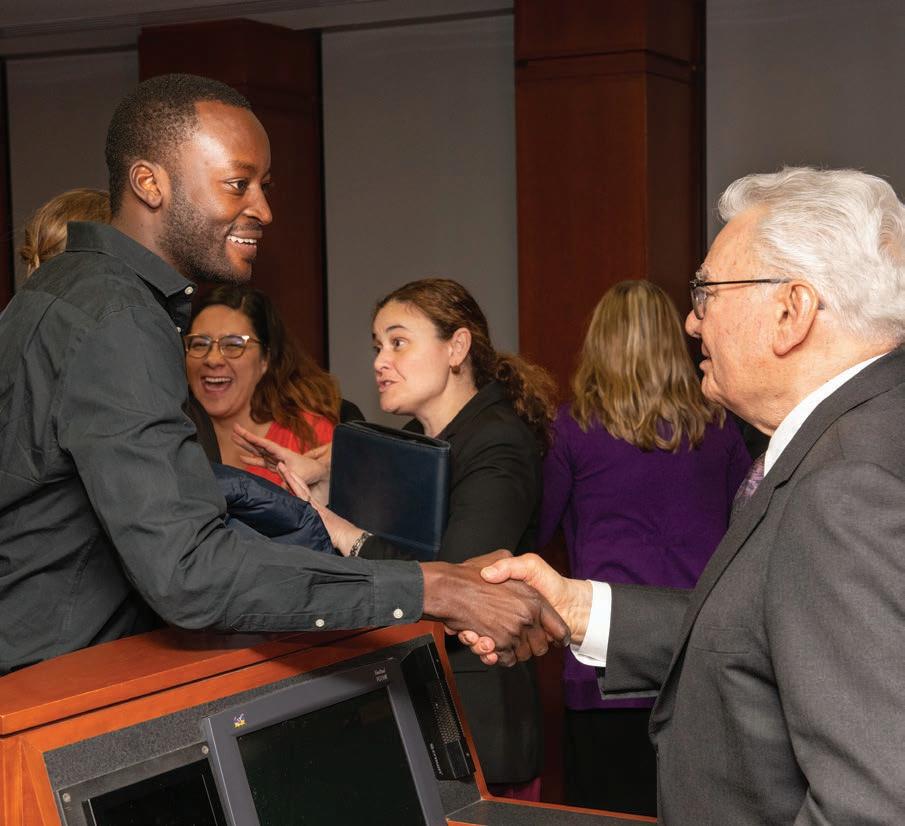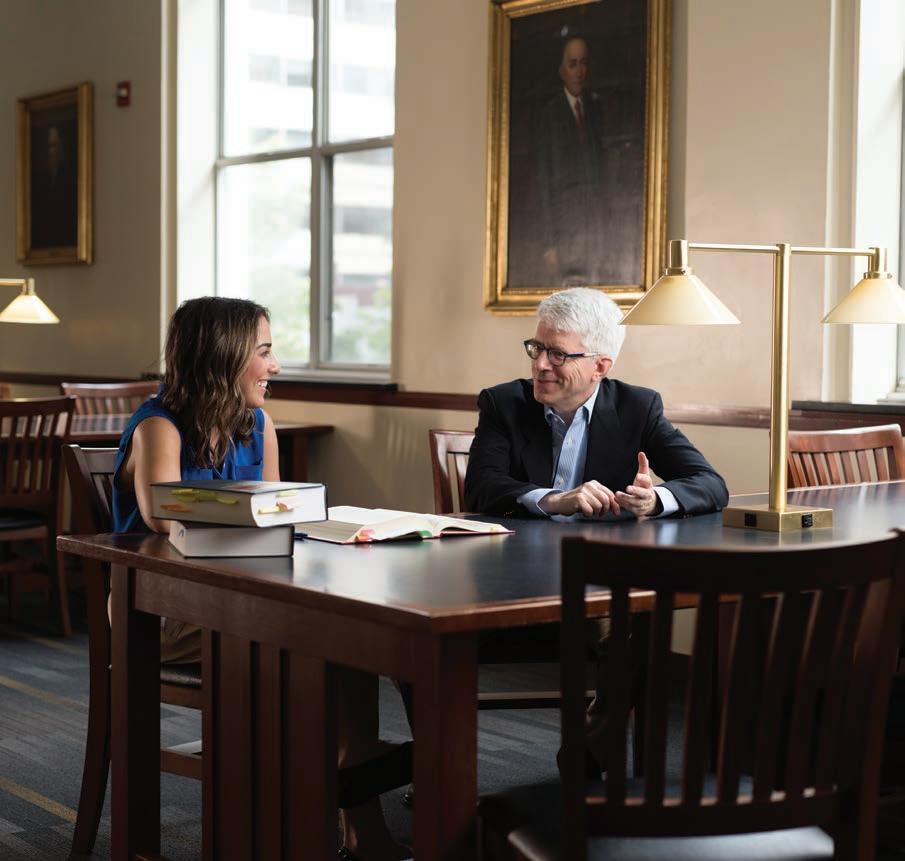NATIONAL SECURITY, CYBERSECURITY, AND FOREIGN RELATIONS LAW
 THE GEORGE WASHINGTON UNIVERSITY LAW SCHOOL
WASHINGTON, D.C.
THE GEORGE WASHINGTON UNIVERSITY LAW SCHOOL
WASHINGTON, D.C.
WHO WE ARE
The George Washington University Law School impacts the law and the world, by uniquely combining renowned scholarship and a D.C.-infused education to prepare students who shape solutions to the pressing challenges of our times.

NATIONAL SECURITY, CYBERSECURITY, AND FOREIGN RELATIONS LAW
AN EXPANSIVE CURRICULUM, A WELL-RESPECTED FACULTY, AN UNBEATABLE LOCATION
The National Security, Cybersecurity, and Foreign Relations Law Program highlights GW Law’s unique strengths: a nationally-recognized faculty, a comprehensive curriculum, and access to the extensive Washington, D.C., national security, cybersecurity, and foreign relations law community. The nation’s capital hosts national security agencies and institutions, including the White House National Security Council, U.S. Department of Homeland Security, U.S. Department of State, World Bank, International Monetary Fund, Defense Nuclear Facilities Safety Board, and U.S. Institute of Peace—all of which are near GW Law.
The dozens of research centers and think tanks that conduct research in foreign relations, cybersecurity, and national security law include GW’s on-campus National Security Archive, which provides a trove of declassified documents pertaining to national security for advanced research. Easy access to Capitol Hill allows students the opportunity to observe the work of House and Senate subcommittees firsthand. The area is also home to a large number of law firms and private sector companies with robust practice areas in the field.
The practice area explores the federal government’s foreign relations powers and the U.S. law of national security and counterterrorism, including law related to
the use of armed forces and intelligence operations abroad, counterterrorism, homeland security, disaster relief and crises management, application of treaties and the law of nations, public controls on trade and foreign investment, admiralty, immigration and asylum, nonproliferation, treatment of aliens including detainees, the law of war, civilian control of the military, congressional investigations and oversight, classified information, and related topics. The practice area has expanded due to the growing vulnerabilities from physical and cyber threats and the world’s increased connectivity through the use of modern technology and cyberspace, and includes law on the use of securing the critical cyber infrastructure and breaches.
www.law.gwu.edu | GW LAW – National Security, Cybersecurity, and Foreign Relations Law 1
WE OFFER THREE DEGREE-PATHS FOR PROSPECTIVE STUDENTS

JURIS DOCTOR (JD)
A traditional law degree with a concentration in national security and cybersecurity law or in national security and foreign relations law.
MASTER OF LAWS (LLM) IN NATIONAL SECURITY AND CYBERSECURITY LAW OR IN NATIONAL SECURITY AND FOREIGN RELATIONS LAW
For U.S.-educated students who have earned a JD and for international students with a primary degree in law.
MASTER OF STUDIES IN LAW (MSL) IN NATIONAL SECURITY AND CYBERSECURITY LAW OR IN NATIONAL SECURITY AND FOREIGN RELATIONS LAW
For professionals who do not have or seek a JD but who wish to deepen their knowledge of national security, cybersecurity, and foreign relations law.
2 GW LAW – National Security, Cybersecurity, and Foreign Relations Law | www.law.gwu.edu
CURRICULUM
GW Law offers one of the largest course catalogs in this field, with more than 50 courses. Students will find both breadth and depth in various facets of the field for a thorough and up-to-date grounding in the evolving field. In addition, students may participate outside the classroom in panel discussions, seminars, and conferences featuring leading practitioners in this area of the law.
All courses are open to JD, MSL, and LLM candidates. The LLM degree programs provide training for new and experienced attorneys for careers in the field, while the MSL degree programs are designed for non-lawyer candidates seeking a deeper understanding of the law.
GW Law welcomes veterans and participates in the Veterans Administration’s Yellow Ribbon Program.
A sample of course offerings:
FOUNDATION COURSES

Cybersecurity Law and Policy
Cybersecurity Law and Technology
National Security Law
Technology Foundations for Cybersecurity
U.S. Foreign Relations Law
ADVANCED COURSES
Artificial Intelligence Law and Policy
Aviation Law and National Security
Blockchain Law, Policy, and Cybersecurity
Counterintelligence Law and Policy
Counterterrorism Law
Crisis and Legal Controversy in the CIA
Disaster Law
Disinformation, National Security, and Cybersecurity: Overview and Legal Approaches
Domestic Terrorism
Foreign Access to U.S. Technology
Foreign Intelligence Surveillance Act
Global Privacy Law and Conflict Seminar
Homeland Security Law
Intelligence Law
The Law of Secrecy
Nation Building and the Rule of Law
Nuclear Nonproliferation Law and Policy
Problems Trying Terrorists in Article III Courts
Selected Topics in Cybersecurity
Law: Risk Management and Incident Response
Transnational Security
For course descriptions and a full listing of the law school curriculum, including courses related to this field, please visit the law school Bulletin at www.law.gwu.edu/gwl/publications.
www.law.gwu.edu | GW LAW – National Security, Cybersecurity, and Foreign Relations Law 3

 Associate Dean Lisa M. Schenck
Professor Emeritus Thomas Buergenthal
Associate Dean Lisa M. Schenck
Professor Emeritus Thomas Buergenthal
PRACTICAL EXPERIENCE
We connect students with real-world practice. First, we promote skillsbuilding through our groundbreaking Fundamentals of Lawyering course, which introduces first-year JD students to the nuanced analytical, research, and writing skills that provide a uniquely experiential introduction to life as an attorney and maps a path for professional identity formation and lifelong learning.
Next, our students gain hands-on experience through opportunities in field placement, with the advantage of participating year-round in placements throughout key institutions in the Washington, D.C., area. Finally, using these advantages of curriculum and location, we assist GW Law graduates in finding successful, fulfilling career opportunities.
FIELD PLACEMENT PROGRAM
Through GW Law’s Field Placement Program, more than 600 students each year receive course credit, supervision by leading legal practitioners, and practical experience that helps jump-start their careers. Our students find dynamic, hands-on externships at organizations such as the Defense Intelligence Agency; the Service Judge Advocate General’s Corps; Office of Justice for Victims of Overseas Terrorism, U.S. Department of Justice; U.S. Immigration and Customs Enforcement; the National Security Division, U.S. Department of Justice; and the Office of the Chief Counsel, U.S. Department of Homeland Security.
CAREER DEVELOPMENT
GW Law’s Center for Professional Development and Career Strategy (Career Center), one of the largest legal career counseling teams in the country, is dedicated to helping students develop personalized career plans. All counselors are former practicing attorneys with extensive experience in the public and private sectors. Our counselors prepare students to hold clerkships; work at law firms; serve in government positions; and work internationally and domestically. The Career Center hosts nearly 100 programs annually, including panels, networking events, the fall recruitment program, spring interviewing program, and public sector recruitment program.
www.law.gwu.edu | GW LAW – National Security, Cybersecurity, and Foreign Relations Law 5
NATIONAL SECURITY, CYBERSECURITY, AND FOREIGN RELATIONS LAW
NATIONAL SECURITY, CYBERSECURITY, AND FOREIGN RELATIONS LAW
THE FACULTY
GW Law is home to leading scholars in national security, cybersecurity, and foreign relations law who have authored leading casebooks in the field.
Associate Dean and Program Director
Lisa M. Schenck, who served as a judge, lawyer, and educator in the Judge Advocate General’s (JAG) Corps before retiring with the rank of colonel, is the author of numerous articles and wrote Modern Military Justice: Cases and Materials (3rd ed., West Academic, 2019). Faculty Co-Director and Professor Edward Swaine and Professor
Sean Murphy co-author the leading case book, U.S. Foreign Relations Law: Cases, Materials, and Practice Exercises, (5th ed., American Casebook Series). Faculty
Co-Director and Professor Laura Dickinson, a national security scholar was awarded the 2021 Mike Lewis Prize for National Security Law Scholarship for her article “National Security Policymaking in the Shadow of International Law” in the Utah Law Review, awarded to the best article on national security law published during the year. Tenured faculty members also include nationally-renowned privacy scholar Professor Dan Solove; Professor F. Scott
15
Kieff, whose work on international trade and innovation addresses national security issues; and Professor Steve Charnovitz, a prominent scholar of international trade law.
The program’s adjunct faculty includes extraordinarily talented and experienced attorneys who have served in senior national security, cybersecurity, and foreign relations law positions within the U.S. government, international organizations, and the private sector. They include the former General Counsel of FEMA; the former Army Judge Advocate General and Deputy Judge Advocate General; former Inspector General of the Intelligence Community; a Court of Appeals Judge for the Armed Forces; former Ambassador for Global Criminal Justice and member of the U.N. Committee on Torture; Department of Justice lead litigators in computer crime, Foreign Intelligence Surveillance Act, and domestic terrorism; and leading experts on cyber law issues and on privacy and surveillance.
INTERNATIONALLY RESPECTED FULL-TIME FACULTY MEMBERS
6 GW LAW – National Security, Cybersecurity, and Foreign Relations Law | www.law.gwu.edu
75+
DISTINGUISHED PRACTITIONERS WHO SERVE AS ADJUNCT PROFESSORS


 Professor Edward Swaine
Professor Sean Murphy
Professor Laura Dickinson (center)
Professor Edward Swaine
Professor Sean Murphy
Professor Laura Dickinson (center)
STUDENT ENRICHMENT

NATIONAL SECURITY LAW ASSOCIATION (NSLA)
GW Law’s NSLA sponsors panel discussions, keynote speakers, and career networking events. NSLA also co-hosts an annual National Security Law Career Fair. The NSLA has held panels on the International Criminal Court, the legal ramifications of the U.S. government employing private security contractors, and intelligence surveillance.
MILITARY LAW SOCIETY (MLS)
The MLS promotes scholarly discussion of military law, veterans’ law, national security law, and related law topics, and builds professional ties between interested students, the law school, and the Washington, D.C., community. The society assists students in identifying internship and career opportunities. MLS students also are dedicated to pro bono work and general community service, participate in military affiliated community service opportunities, and provide assistance with various pro bono projects that provide legal services for servicemembers and veterans.

EVENTS
Numerous events each year showcase the leading practitioners and policy makers in the field. Recent events include a fireside chat between GW Law Dean Dayna Bowen Matthew and General Counsel for the U.S. Department of the Army Carrie Ricci, LLM ’05, and a U.S. Army Court of Criminal Appeals appellate hearing.
NATIONAL SECURITY, CYBERSECURITY, AND FOREIGN RELATIONS LAW
PROGRAM DIRECTOR
Lisa M. Schenck, J.S.D. Associate Dean for National Security, Cybersecurity, and Foreign Relations Law and Distinguished Professorial Lecturer in Law lschenck@law.gwu.edu
202.994.0681
FACULTY CO-DIRECTORS
Laura A. Dickinson Oswald Symister Colclough Research Professor of Law ldickinson@law.gwu.edu
202.994.0376
Edward Swaine
Charles Kennedy Poe Research Professor eswaine@law.gwu.edu
202.994.1684

ADMISSIONS INFORMATION admissions@law.gwu.edu
202.994.1010
GRADUATE AND INTERNATIONAL PROGRAMS
202.994.7242
LLM ADMISSIONS llmadmissions@law.gwu.edu
MSL ADMISSIONS msladmissions@law.gwu.edu
SJD ADMISSIONS sjdadmissions@law.gwu.edu
www.law.gwu.edu/national-security-cybersecurity-foreign-relations-law
THE GEORGE WASHINGTON UNIVERSITY LAW SCHOOL
THE GEORGE WASHINGTON UNIVERSITY LAW SCHOOL 2000 H Street, NW Washington, D.C. 20052
 THE GEORGE WASHINGTON UNIVERSITY LAW SCHOOL
WASHINGTON, D.C.
THE GEORGE WASHINGTON UNIVERSITY LAW SCHOOL
WASHINGTON, D.C.





 Associate Dean Lisa M. Schenck
Professor Emeritus Thomas Buergenthal
Associate Dean Lisa M. Schenck
Professor Emeritus Thomas Buergenthal


 Professor Edward Swaine
Professor Sean Murphy
Professor Laura Dickinson (center)
Professor Edward Swaine
Professor Sean Murphy
Professor Laura Dickinson (center)


